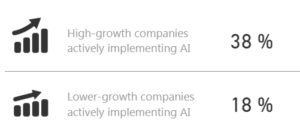
High Growth Companies Extending Their Lead with AI

(MSSA/Shutterstock)
Knowing what to invest in has always been a key differentiator in business. Those that do it well tend to thrive, while those that do it poorly tend to stagnate and die. These days, fast-growing companies are choosing to invest more in artificial intelligence than their low-growth brethren. But are they picking a winner?
A new study from Microsoft suggests that high-growth companies are investing more in artificial intelligence (AI) technology than low-growth companies. What’s more, leaders of high growth companies feel a stronger sense of urgency to make progress with AI in the near term.
Microsoft surveyed more than 1,150 executives in Europe and the United States to measure their current investments in AI, as well as gauge their future outlook for the use of AI in their companies. The software giant shared the results on March 4.
Arguably the most compelling piece of data to come out of the survey is that high growth companies (defined as growing revenues 10% or more year-over-year) are more than twice as likely to be using AI compared to companies growing revenues in the single-digits. Microsoft found that 38% of high-growth companies are actively implementing AI, versus 18% of low-growth companies.
High growth companies also have a much stronger sense of urgency when it comes to their AI investments, according to Susan Etlinger, an industry analyst with Altimeter Group.
“To me the most compelling finding that comes out of this research is a strong sense of urgency, and that urgency to be honest isn’t shared among everybody who responded to the survey,” Etlinger says in a video accompanying the results. “[High-growth companies] are looking at a one- to three-year time frame, versus for the other companies it’s a three- to five-year timeframe, which really shows they’re taking this seriously and moving ahead.”
There’s certainly no secret that AI is a hot item. Companies are plowing billions into the construction of data lakes and data processing pipelines, and hiring data scientist and engineers to turn that big data into insight. Some estimates peg AI as a $191 billion opportunity by 2024. It’s clearly not a secret.
While we’ve all heard the same message, we’re reacting to it differently. In addition to different levels of urgency, there are differences in the ways that AI is being implemented at high growth companies versus low growth companies.
You might expect that productivity enhancements – such as using chatbots to boost the efficiencies of call centers operations or using machine learning to optimize pricing in a retail setting – would rule the road. But according to Microsoft’s study, executives at more AI-forward companies are using technology to improve long-term decision-making and planning.
Heike Bruch, a leadership professor at the University of St. Gallen in Switzerland, says the most surprising finding to come out of the study was that senior executives plan to use AI to free up time to pursue leadership-related activities and to help escape what she called the “acceleration trap.”
“Fifty percent of companies are in an overheated mode…where they’re operating at the limit. They have too many activities, and they don’t have the right time to make the right choices,” Bruch says in another video that accompanied Microsoft’s research. “If they are using AI to free time for real people-related tasks, human–centered tasks, I think this is exactly what is need going forward.”
Ethics and Culture
We are at the very beginning of the AI era, and it’s safe to assume that this technology will be around for a long time. But there are some real differences in the way that companies are approaching the construction of an AI culture within their organizations.
The Microsoft research, which was conducted with Professor Bruch’s Institute for Leadership and Human Resources Management, suggests that high-growth, AI-forward companies hold the advantage when it comes to building culture, according to Michel van der Bel, the president of Microsoft EMEA.
“If you think about moving from know-it-all company to a learn-it-all company – that’s super critical,” van der Bel says in a video. “A lot of leaders are thinking about their role in AI, going from being manager to be more a mobilizer. Because how do you mobilize these things? How do you cut through hierarchy? How do you cut through always having the right answers, versus saying, what are the right questions to ask?”
Data was also correlated between higher AI investments and belief in the importance of AI ethics, Etlinger says.
“When you look at the set of leaders who are reporting higher growth and are more actively involved in AI implementations, they are much more likely to see AI ethics and responsible AI as a leadership imperative,” Etlinger says. “What that says to me is that the more you know about how to use AI, the more likely you are to understand the opportunities, understand the realities, and actually kind have a positive outlook on what’s to come.”
AI will certainly be a tool that companies use to create a competitive advantage. In fact, it’s already occurring. If Microsoft’s research is accurate, then the benefits of AI are already accruing to the companies that have the most momentum.
This should be a wakeup call to companies that are content with the status quo. AI is already a factor in competition, and it will be even more so in the future. Companies that have not yet taken steps to build a data and AI strategy are not doomed to failure. But considering the head-start that high-growth AI-forward companies have, they have some catching up to do.
Related Items:
Building Data Culture a Priority as AI Investments Ramp Up
The Tipping Point for Artificial Intelligence
AI Investment Up, ROI Remains Iffy





























